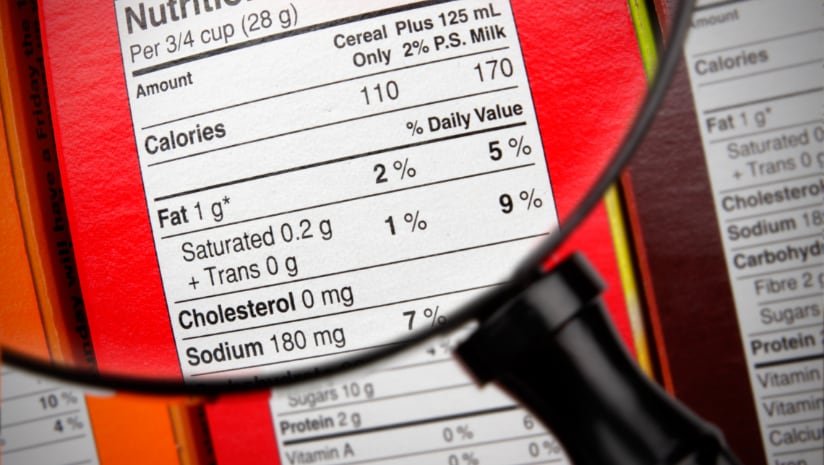Sugar reduction pledges. Sodium-slashing targets. Wholegrain hype. Reformulation has become one of the industry’s favourite buzzwords – but how much real progress is actually being made in the bakery and snack aisles? While some countries are pouring money into SME support and setting clear public health goals, others are still letting consumer demand do most of the heavy lifting.
Scotland is leading the way in reformulation, demonstrating how targeted government support can drive meaningful change in the food industry. The Scottish Government has extended another year of funding for the Food and Drink Federation (FDF) Scotland’s Reformulation for Health Programme, which has been instrumental in helping small and medium-sized enterprises (SMEs) make their products healthier since 2019.
The programme is again offering SMEs tailored support and grants – like the £5,000 Reformul8 Challenge Fund – to remove salt, fat, sugar and excess calories from everyday products. This initiative has already removed billions of calories and significant amounts of fat, salt and sugar from the Scottish diet.
“We are delighted to receive another year’s funding from the Scottish Government, allowing us to support more Scottish food and drink businesses to make their food healthier, from butchers and bakers to ready meal makers,” said Joanne Burns, FDF Scotland’s Reformulation for Health manager.
So, while Scotland is making headway with clear government support, how does the rest of the world compare?
UK: Regulatory nudges & regional leadership
The UK was one of the early leaders in setting voluntary reformulation targets, beginning with salt reduction way back in 2006. The focus later expanded to sugar and calories, especially in bakery staples like biscuits, cakes and morning goods. But progress has been patchy.
According to the UK government’s latest sugar reduction report, by 2020 the average sugar content in bakery products fell by just 4.8% – far below the 20% target. Cakes and biscuits remained some of the most resistant categories to change. This is because reformulation without compromising taste, texture and shelf life is technically tricky and costly, especially for smaller players.
That said, the industry is still nudging forward. Retailers like Tesco and Sainsbury’s are putting pressure on suppliers to meet HFSS (high fat, salt and sugar) guidelines introduced in 2022, particularly for snacks. And there are signs of momentum in niche categories like better-for-you flapjacks, protein cookies, and reformulated tea cakes.
The upcoming restrictions on the promotion on HFSS products is expected to boost momentum. Starting October 2025, these regulations will limit instore promotions and advertising of products deemed high in fat, salt and sugar, especially in prominent locations like checkouts and end-of-aisle displays. This move aims to encourage manufacturers to reformulate products to meet healthier standards and reduce the visibility of less healthy options to consumers.
EU: Patchwork progress
Unlike the UK, the EU takes a decentralised approach and reformulation targets vary between countries. The Netherlands has led voluntary agreements with bakery manufacturers to cut salt in bread by 25% since 2009, while France has encouraged sugar and fat reductions through public-private nutrition pacts.
A 2022 EU Joint Research Centre study highlighted that while some countries are making headway, others lack structure. Reformulated bakery products often still sit on premium shelves, not mainstream ones, and sugar remains stubbornly high in many sweet baked goods.
A bright spot: research from Wageningen University showed that cakes and pastries could reduce both sugar and fat by 30% without major sensory compromise - suggesting the potential is there if governments and retailers push harder.

US: Slow shifts, consumer-led
In the US, reformulation is largely a brand- or retailer-led initiative. The FDA has published voluntary sodium targets, but unlike the UK or EU, there are no category-wide sugar targets for bakery or snacks.
That means the bulk of movement is happening in response to wellness trends. Brands like Kind, Simple Mills and Quest have leaned into low-sugar, high-protein formulas, while major players like General Mills and Mondelez are quietly reducing sugar or offering 100-calorie packs to help with portion control.
According to Circana, just 9% of the top-selling US snack brands have reformulated to reduce added sugar or sodium in the past two years. The rest are leaning on packaging tricks, portion tweaks or consumer education.
However, under Robert F Kennedy Jr’s ‘Make America Healthy Again’ agenda as head of the Department of Health and Human Services (HHS), things are heating up. RFK Jr has already banned synthetic food dyes - a major shake-up for US food manufacturers – and this is likely just the beginning. The move is expected to trigger a broader push for stricter food regulations, potentially accelerating reformulation efforts across categories. If new mandates begin to target other additives and demand cleaner labels, even more pressure will be placed on bakery and snack brands to adapt: not just to consumer trends, but to legal requirements.
Canada: Intentional reformulation moves
Canada’s approach to reformulation sits between the more hands-off US model and the stricter regulatory environment of the UK. Health Canada introduced voluntary sodium reduction targets in 2012, updating them in 2021. While reformulation efforts in the snack and bakery sectors have been relatively modest so far, mounting pressure is driving momentum.
One potential accelerant is the country’s proposal to implement front-of-pack (FOP) warning labels for products high in sodium, sugar and saturated fat. This move could significantly impact reformulation across categories such as packaged muffins, pastries and salty snacks.
However, the Baking Association of Canada (BAC) has voiced concern. Denise Lee, director of Food and Nutrition Policy at BAC, supports the intent behind the FOP initiative but warns against disproportionate impacts. “If the government is going to support this front-of-pack labelling, then they should provide the education to support it,” she says. “And they have been – there are education platforms out there – but I don’t know if it’s enough yet.”
Lee also notes that ingredients like salt, which play essential structural and preservation roles in bakery products, are at risk of being unfairly ‘demonised’. The BAC argues that overly simplified health messaging can mislead consumers and diminish the cultural and functional value of traditional baked goods.
Australia & New Zealand: Cereal-heavy, bakery-light
Down under, most reformulation focus has gone to breakfast cereals and processed meats, not baked snacks or indulgent treats. Australia’s Healthy Food Partnership has set targets across food categories, but uptake in bakery has been muted.
Some retailers – like Woolworths – are nudging private-label reformulation and startups are responding to health-conscious consumers. But sodium and sugar content in core baked snacks remains largely unchanged from a decade ago, according to a 2023 review by the George Institute for Global Health.
New Zealand, meanwhile, has proposed front-of-pack warning labels and sugar taxes, but little has been implemented in law.
Emerging Markets: Tax drives, not tech overhauls
In markets like Mexico, South Africa and India, reformulation has been driven by fiscal tools – mainly sugar taxes. These have spurred some innovation in snacks and beverages, but the bakery sector remains more sluggish.
India’s FSSAI (Food Safety and Standards Authority) is pushing for salt and sugar reductions in processed foods, including cookies and pastries, but cost barriers and low consumer awareness limit progress.
In Latin America, multinational players like Grupo Bimbo are leading reformulation efforts to meet regional guidelines but often focus on export lines and urban markets.
Reformulation in action
While the journey towards healthier bakery and snack products is ongoing, several companies have made notable strides:
UK: Warburtons slims down
The bakery manufacturer has quietly become one of the UK’s most proactive bread brands on reformulation. Its Wholemeal Thin Bagels and Hi-Protein Loaf are examples of low-calorie, higher-fibre NPD aimed at both health-conscious shoppers and HFSS-compliant shelves. The company has also cut salt across its core bread range by up to 30% over the past decade.
Germany: Dr Oetker bakes a better brownie
Dr Oetker’s Yes! It’s Vegan snack line includes reformulated cakes and brownies with lower saturated fat and no eggs or dairy, responding to Germany’s booming plant-based trend and EU reformulation nudges. Sugar content has been trimmed by around 20%, while fibre has increased thanks to chicory root and oat-based additions.
France: Bel Group lightens its cheese
The Mini Babybel and The Laughing Cow brand owner has reformulated its popular cheese snacks to reduce saturated fat and sodium without compromising taste. The company has achieved up to a 15% sodium reduction across several SKUs and introduced plant-based variants to align with France’s Nutri-Score labelling system and growing flexitarianism.
US: Kind cuts sugar
Kind Snacks reformulated several of its bars in 2023 to reduce added sugars by as much as 25%, using chicory fibre and a lighter touch on honey without losing crunch appeal. The move helped retain its ‘non-GMO, no artificial sweeteners’ positioning while winning listings in wellness-focused retail chains like Sprouts and Thrive Market.
Canada: Dempster’s goes whole grain
The Bimbo-owned Canada Bread Company brand now offers several breads with 100% whole grain and lower sodium levels. Reformulated products like its Zero Zero White Bread (zero added sugar, zero artificial preservatives) respond directly to Health Canada’s push for cleaner labels and front-of-pack sodium warnings.
Australia: Carmen’s tackles sugar gently
The Australian cereal and snack company has reformulated its Oat & Nut Bars to reduce total sugars and calories per serve while maintaining a clean label profile. The changes align with Australia’s Healthy Food Partnership targets, and the brand promotes its slow-release energy benefits over sweetness.
Mexico: Marinela adapts to tax pressure
Grupo Bimbo’s Marinela brand reformulated its popular Mini Mantecadas (muffins) in 2022 to reduce added sugars and saturated fats after Mexico’s sugar tax and front-of-pack warning label system came into effect. Sales dipped initially but rebounded after the reformulated version passed government thresholds for ‘no warning label’ status.
India: Britannia boosts fibre
The biscuit giant has revamped several biscuit lines, including its popular NutriChoice Digestive range, to include more whole grains and added fibre while cutting trans fats and sugar. The reformulation reflects both consumer demand and government pressure via the Food Safety and Standards Authority of India’s (FSSAI) Eat Right movement.
South Africa: Albany targets school lunchboxes
Tiger Brands’ bread brand has reduced sodium across its standard white and brown loaves by over 20% and launched new whole grain formats for school-aged children. The changes align with SA’s salt reduction regulations and aim to tackle childhood obesity while retaining flavour and texture appeal.
Japan: Calbee reworks potato snacks
The snack producer has reformulated its flagship potato chip lines to reduce oil absorption during frying, cutting fat content by up to 25%. Additionally, its Jagabee sticks now include added dietary fibre and reduced sodium versions to appeal to Japan’s aging population and health-conscious snackers.
These are just a fraction of the reformulation efforts underway. Many more products on shelves today reflect the industry's commitment to healthier options.
There’s no question reformulation is happening. Across regions, bakery and snack manufacturers are tinkering with ingredients, replacing saturated fat with fibre, swapping out sugars and balancing textures with tech.
But the scale and speed vary dramatically. The UK has policy teeth (even if voluntary). The US relies on consumers. The EU is fragmented. And Canada and Australia are cautiously watching from the sidelines.
What’s clear is that when funding, policy pressure and consumer demand align – as they do in pockets like Scotland or the Netherlands – reformulation is not just possible, but profitable.





